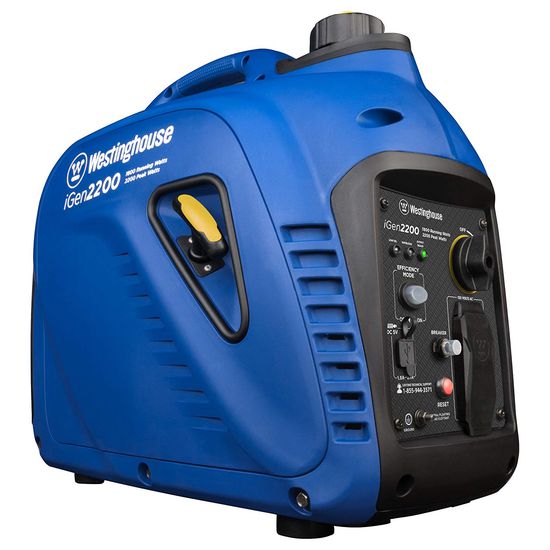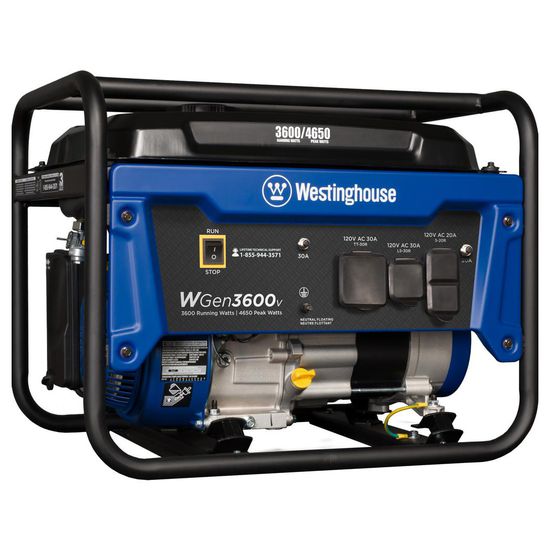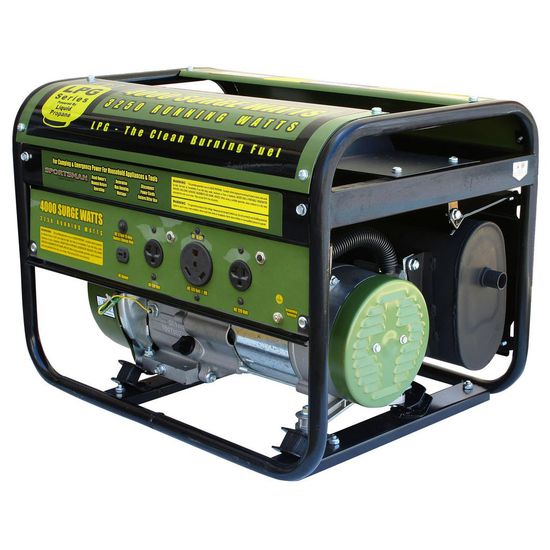A good generator is handy for a variety of purposes, from powering essential home appliances during an outage to running camping or tailgating equipment, or even powering a backyard toolshed. The most important criterion when choosing a portable generator is how much power it produces, measured in watts. Manufacturers specify starting watts and running watts. The starting wattage is always a higher number, because many appliances require more watts to initially power them up than to keep them running. To keep your home functioning during a blackout, you want a generator with enough juice to run critical appliances as well as multiple must-have electronics — otherwise you'll be forced to choose which items to shut off so the generator can power the rest.
If you're looking for an emergency power source, experts recommend a portable generator with a minimum of 3,000 watts. That should be enough for critical needs such as the lights and refrigerator/freezer, plus a few extras, such as a radio, TV, and mobile-phone charger. But factor in a heating and cooling system or a space heater, and even a simple coffee maker or iron, and your total household wattage will likely sail well past 3,000. (An online wattage calculator, such as these from Honda and Northern Tool, can help determine how much power you need.)
Generally, the more powerful a generator is, the more it costs. Beefier models in 7,000-to-10,000-watt territory cost well over $1,000. Extra features, such as an electric starter, may also boost the price. Portable generators in the 3,000-to-4,000-watt power range are fairly compact, but a standard model typically weighs between 100 and 125 pounds. While the best portable generators often come with wheel kits and some have RV-ready outlets, they're not incredibly easy to move around. Then again, many buyers will keep them parked near their houses most of the time anyway.
Gas- and Propane-Powered Generators
Most of the portable generators we review here use unleaded gasoline, which comes with a few drawbacks. A natural disaster can deplete or disrupt a region's gas supply. Moreover, storing large quantities of gasoline isn't exactly safe, and its shelf life is limited. The fuel starts to break down after a few months, and if you use old fuel in a gas generator, you run the risk of gumming up the engine, which creates a real mess.
Propane generators are a good alternative to gas models but are less common, and a good one may cost a bit more than a comparable gas generator. One advantage of a propane generator is that propane can be stored almost indefinitely. Additionally, propane tanks are safer to store than full gas cans. Propane generators use 20- or 30-pound tanks. Listed run times usually assume a 20-pound tank. For consumers who want the flexibility to choose between fuel sources, dual-fuel portable generators can run on either gas or liquid propane.
While many generators come boxed with oil, and often a funnel or other required tools, make sure you have the necessary lubricant and fuel on hand, along with several heavy-duty extension cords and a power strip to connect essential appliances and electronic devices. And finally, always be sure to run the generator outdoors; the burning fuel releases harmful carbon monoxide.
Inverter Generators
For those who need easily portable power, perhaps for camping, tailgating, or using power tools at a job site, an inverter generator may make more sense. These devices are much smaller and lighter — they often weigh 50 pounds or less — and, thanks to advanced technology, they provide greater fuel efficiency and clean power for sensitive electronics like cellphones, computers, and tablets. Many inverter generators also have parallel kits available that allow two generators to be connected at once, doubling the power at your disposal. Inverter models are pricier than conventional portable generators. They are hard to find under the $300 mark, and those at the bottom end of the price range typically don't have enough wattage to serve any but the most basic power needs.
Run Time
The amount of time a generator can run on a single tank of gasoline or propane varies considerably. Generally, the more appliances and electronics connected to a generator's outlets, the more quickly it needs to be refueled. A generator's run time is measured in hours and assumes it is running at "half load," meaning it's using only 50 percent of the available running watts (i.e., a half load for a 3,000-watt generator would be 1,500 watts). The 3- to 4-gallon tanks on the conventional gas generators we picked should keep them running for about 10 to 12 hours.
Inverter generators have much smaller tanks, usually only a gallon or two, so run times are generally shorter. That said, they're much more fuel efficient, particularly those with energy-saving modes that automatically adjust the engine speed to expend less power when running lighter loads.
Outlets
Portable generators typically have three or four power outlets, but they're not all standard, household-type plugs. Aside from regular 120-volt outlets for lamps, refrigerators, heaters, and the like, generators often include a 120-volt connector designed for RVs in addition to a twist-lock outlet that keeps a plug securely in place. A generator with multiple standard 120-volt outlets is the best option, because more than one extension cord can be attached to serve more household needs.
Noise
Portable generators can be fairly loud, even though many have mufflers. Most of our picks come in under 68 decibels — which would be less strident than the sound of a home vacuum cleaner — but even that can get to be a bit much for some ears, particularly when run for hours at a time. Inverter generators generally produce less noise than conventional generators, usually 50 dB or less, which is another reason they are often preferred for camping trips or RV parks. For consumers willing to pay a premium for less noise, a Honda generator might be best: The brand is known for its line of whisper-quiet models.
















